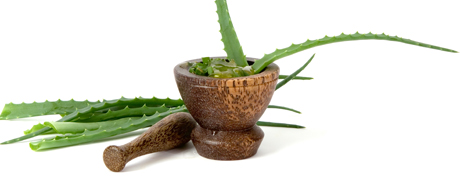Exclusives
The Aloe Phenomenon
Beyond burn treatment, aloe is earning a solid reputation as a functional beverage.

By: Sean Moloughney

Usually found on many kitchen windowsills, the humble aloe plant is a time-tested, go-to remedy for topical cooking burns and sunburn. But taken internally, aloe is a potent source of vitamin B12 and is packed with beneficial minerals.
Aloe cultivation has spread to a variety of global locales, most notably in hothouses in China. The most current number quantifying the worth of the raw aloe market came from an International Aloe Science Council presentation (October of 2004), which placed the market value at $125 million, however, industry players said that number has grown steadily. “Due to the increase in consumers demand for natural products, aloe as a natural ingredient is showing growth,” commented Patrick Anderson, western regional sales manager for Melbourne, FL-based Terry Labs. “In comparison to previous years aloe vera showed exponential growth.”
Bill Pine, vice president, Improve USA Inc. of Desoto, TX, and Jeff Barrie, eastern regional sales manager for, Lacey, WA-headquartered Aloecorp, both attributed the growth to aloe’s longstanding, trustworthy reputation and added that word of mouth has proven to be the best marketing system.
“Aloe is one of the most trusted herbs in the industry and has been relied upon for many years,” said Mr. Pine. “We see a renewed interest at this time.”
“With aloe,” added Mr. Barrie, “once you start taking it, the benefits occur in a relatively short time. I’ve been around aloe over 30 years and I’ve seen many skeptics experience the benefits of aloe and it doesn’t take long before they join a growing number of what I like to call aloe-aholics.”
Mr. Anderson concurred. “As more consumers became educated and aware of aloe vera and its effects on the skin, colon and immune system, aloe showed marked improvements year to year,” he said. “The current economy is breeding healthier and more educated consumers. Health maintenance is a priority for a large group of people. When finances are tight these consumers start to look in markets where results can be gotten at the right price point. The nutraceutical market offers the right price with proven results.”
Ongoing Research
The body of research on aloe dates back to 1939 and spans some 200 scientific papers that cover the plant’s anti-inflammatory, anti-bacterial and anti-viral properties for conditions such as irritable bowel syndrome, heartburn, cardiovascular and immune support, and even stomach ulcers.
One of the latest and most noteworthy research studies was conducted by the International Aloe Science Council regarding the effects of aloe vera when consumed with vitamins. The study, conducted at The University of California Davis, demonstrated that aloe vera increased the bioavailability of vitamin B12 and vitamin C.
Both Aloe vera gel and whole leaf aloe were tested in the randomized crossover trial, with the gel demonstrating the strongest results in promoting the absorbance of vitamins C and B12. Just one ounce of aloe exhibited “substantial effects” in enhancing the absorption of a 500 mg dose of vitamin C and 1 mg dose of B12.
Aloe also prolonged the plasma levels of those vitamins, stretching the beneficial effects out over a greater length of time when compared to the placebo. It additionally promoted a significant increase in the antioxidant potential of the plasma, with ORAC ratings particularly high after four hours and remaining high even after 24 hours.
“It’s clear that consuming aloe vera along with vitamin supplements would be beneficial especially among populations for whom B12 deficiency is an issue, such as the elderly,” commented Dr. Sridevi Devaraj, associate professor at UC Davis’ Laboratory for Atherosclerosis and Metabolic Research, when he presented the study at the Experimental Biology Convention in Washington D.C. in April of 2007. “Based on this study’s results, aloe vera may be considered as an effective approach to getting the most out of any vitamin supplement program.”
“There are so many surprising benefits of aloe vera,” said Gene Hale, former executive director of the International Aloe Science Council, following Dr. Devaraj’s presentation. “We hope this opens up new product ideas for beverage, food and supplement manufacturers and gets into consumers’ hands. The positive effects are boundless for anyone who takes nutritional products.”
The UC Davis study built upon previous research conducted at the University of Scranton, which examined aloe’s ability to enhance the bioavailability of vitamins C and E—a remarkable feat considering that aloe vera enhanced the absorption of both fat and water-soluble compounds, the Scranton study concluded.
The UC Davis study confirmed the University of Scranton researchers’ assertion that “Aloe vera is unique in its ability to improve the absorption of both these vitamins and should be considered as an adjunct for people who take vitamin supplements.”
“People are becoming more aware of the necessity to take care of themselves,” observed Mr. Pine. “I see a more focused effort in trying to maintain good health. This is good for any herb that can promote the immune system and aid in preventing us from getting ill or possibly not as ill.”
Mr. Barrie said he was excited by the growing consumer awareness of aloe, as well as the growing interest of companies from the nutraceutical drink business that are increasingly looking to aloe as a functional formulary ingredient. “I think the day is coming when we’re going to see aloe as an ingredient in mainstream grocery stores,” he said.


